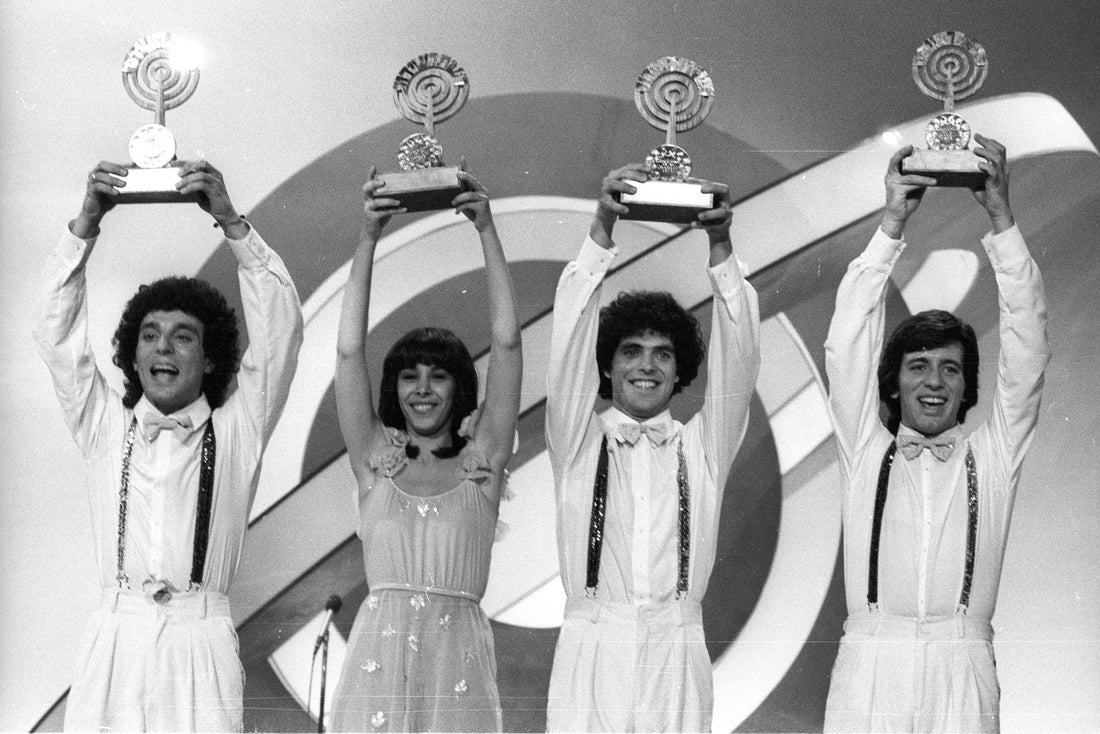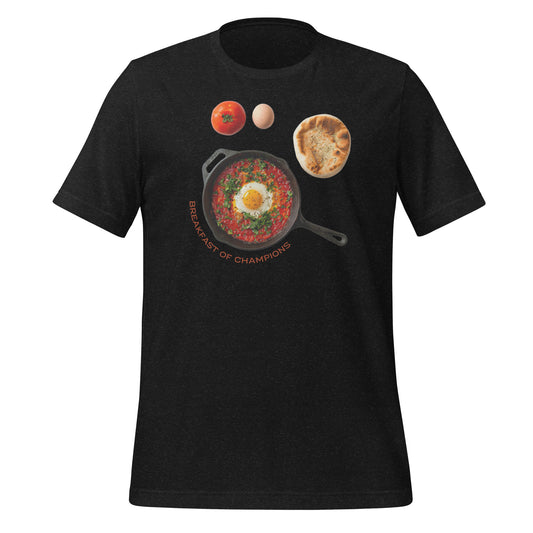
Israel at Eurovision: A Musical History of Hope, Heart, and High Notes
Share
Since debuting in 1973, Israel has made Eurovision history more than once. With four iconic wins, countless dramatic moments, and entries in Hebrew, English, Arabic, and even Amharic, Israel's presence on the Eurovision stage has reflected not just musical ambition, but cultural resilience, creativity, and pride. Whether you’re humming “A-Ba-Ni-Bi” or belting “Toy” into your hairbrush, Israel’s contributions to Eurovision are unforgettable.
Stick around to the end of this post — we’ve tucked a Eurovision playlist down there that’s pure gold. Kudos to Martin Phillip Fjellanger who had the genius idea to round up Israel’s greatest hits in one place.
Israel’s Most Iconic Eurovision Performances
“A-Ba-Ni-Bi” – Izhar Cohen & The Alphabeta (1978)
Israel’s first-ever win at Eurovision came during a decade when disco ruled the airwaves. Izhar Cohen took to the stage in Paris with boundless energy, shimmering outfits, and a nonsense chorus that somehow managed to feel deeply joyful. “A-Ba-Ni-Bi” wasn’t just catchy – it was infectious. The playful gibberish was actually a code language used by kids in Hebrew, giving the performance both local charm and universal appeal. It kicked off Israel’s lasting romance with Eurovision in style.
“Hallelujah” – Milk and Honey (1979)
A year later, Israel hosted the contest in Jerusalem and pulled off the nearly impossible: a back-to-back win. Performed in a time of global political tension and shifting borders, “Hallelujah” struck a chord with its message of unity and hope. The chorus, sung by Gali Atari and group Milk and Honey, became an unofficial anthem in Israel, still performed at national ceremonies and memorials to this day. It’s one of Eurovision’s most enduring legacies.
“Diva” – Dana International (1998)
1998 was a landmark year for Eurovision and a cultural turning point. Dana International, already a pop star in Israel, made history in Birmingham as the first openly transgender performer to win the contest. “Diva,” with its unapologetic glam, thumping beat, and nod to powerful women throughout history, was more than a song – it was a statement. Her win sparked conversations across Europe and cemented her as a queer icon long before the term was mainstream.
“Toy” – Netta (2018)
By 2018, Eurovision had become a digital juggernaut, and Netta knew exactly how to play the game. Representing Israel in Lisbon, she brought loop stations, quirky chicken clucks, and a bold message about self-worth and empowerment. “Toy” was weird, wonderful, and wildly effective. It resonated with audiences around the world and went viral almost instantly. Israel’s fourth win proved that originality and confidence still reign supreme on the Eurovision stage.
“Unicorn” – Noa Kirel (2023)
In a contest dominated by high production values and global fanbases, Noa Kirel came in strong for Israel in 2023. With her powerhouse vocals, complex choreography, and a sleek stage show, “Unicorn” combined Middle Eastern flair with polished pop. Landing in third place during a politically charged year, her performance was widely praised for its artistry and strength. It solidified her place as a rising international star and a Eurovision favorite.
Israeli Eurovision Gems Worth Revisiting
“Ben Adam” – Yardena Arazi (1988)
Yardena Arazi, already a beloved figure in Israeli music, brought "Ben Adam" ("Son of Man") to the Dublin stage in 1988. The song is a poetic meditation on human nature, with biblical and philosophical echoes woven into a rich, haunting melody. Arazi's performance was polished and elegant, dressed in a sparkly shoulder-padded number that firmly rooted it in the decade. Though it finished a respectable 7th place, the song has aged beautifully and feels as relevant today as ever—an overlooked gem in the Eurovision archives.
“Amen” – Liora (1995)
In a year of neon lights and big vocals, Liora's "Amen" stood out by doing the opposite. The 1995 entry, performed in Dublin, was stripped-down and spiritual, leaning heavily on the emotive power of its Hebrew lyrics and orchestral backing. There were no gimmicks, just raw simplicity and heartfelt delivery. It placed 8th, but ask any Israeli Eurovision fan and they'll tell you this one should've ranked higher. It remains a quiet classic.
“Made of Stars” – Hovi Star (2016)
With dramatic vocals and theatrical flair, Hovi Star took the Stockholm stage in 2016 with "Made of Stars"—a cinematic ballad written by Doron Medalie, who also penned Netta's "Toy." Though the song was praised by juries, it didn’t quite capture the popular vote, placing 14th in the final. Still, the performance was technically stunning, and Hovi's goth-pop aesthetic gave the contest one of its more memorable and underrated entries in recent years.
Impact of Eurovision on Israeli Pop Culture
Many Eurovision songs fade into obscurity. But some — especially from Israel — live on. “Diva” became a club classic across Europe. “Hallelujah” is sung at commemorations. “Toy” went viral globally, even winning the Barbara Dex Award for its quirky fashion (an honour in its own right). These songs transcend the contest, becoming symbols of identity, celebration, and sometimes protest.
Why Is Israel in Eurovision Anyway?
It’s a common question. Eurovision is run by the European Broadcasting Union (EBU), which includes countries that are part of the EBU, not just the EU. As a longstanding EBU member, Israel participates alongside countries like Australia and Azerbaijan. Eurovision isn’t about geography; it’s about broadcast partnerships and shared cultural spectacle.
What Does Eurovision Mean to Israelis?
For many Israelis, Eurovision is more than a glitzy song contest. It’s a stage to show the world a different side of Israel — artistic, creative, emotional, and connected to Europe. It’s a moment of unity in a region where harmony is rare. And in recent years, it’s become a beacon of pride, representation, and resilience — especially in difficult times.
Israel’s Eurovision Results (1973–2025)
| Year | Artist | Song | Language | Final Result |
|---|---|---|---|---|
| 1973 | Ilanit | Ey Sham | Hebrew | 4 |
| 1974 | Poogy | Natati La Khaiai | Hebrew | 7 |
| 1975 | Shlomo Artzi | At Ve'Ani | Hebrew | 11 |
| 1976 | Chocolate, Menta, Mastik | Emor Shalom | Hebrew | 6 |
| 1977 | Ilanit | Ahava Hi Shir Lishnayim | Hebrew | 11 |
| 1978 | Izhar Cohen and the Alphabeta | A-Ba-Ni-Bi | Hebrew | 1 🏆 |
| 1979 | Milk and Honey | Hallelujah | Hebrew | 1 🏆 |
| 1981 | Habibi | Halayla | Hebrew | 7 |
| 1982 | Avi Toledano | Hora | Hebrew | 2 |
| 1983 | Ofra Haza | Hi | Hebrew | 2 |
| 1985 | Izhar Cohen | Olé, Olé | Hebrew | 5 |
| 1986 | Moti Giladi and Sarai Tzuriel | Yavo Yom | Hebrew | 19 |
| 1987 | Datner and Kushnir | Shir Habatlanim | Hebrew | 8 |
| 1988 | Yardena Arazi | Ben Adam | Hebrew | 7 |
| 1989 | Gili and Galit | Derekh Hamelekh | Hebrew | 12 |
| 1990 | Rita | Shara Barkhovot | Hebrew | 18 |
| 1991 | Duo Datz | Kan | Hebrew | 3 |
| 1992 | Dafna | Ze Rak Sport | Hebrew | 6 |
| 1993 | Lehakat Shiru | Shiru | Hebrew, English | 24 |
| 1995 | Liora | Amen | Hebrew | 8 |
| 1998 | Dana International | Diva | Hebrew | 1 🏆 |
| 1999 | Eden | Happy Birthday | Hebrew, English | 5 |
| 2005 | Shiri Maimon | HaSheket SheNish'ar | English, Hebrew | 4 |
| 2015 | Nadav Guedj | Golden Boy | English | 9 |
| 2018 | Netta | Toy | English, Hebrew | 1 🏆 |
| 2023 | Noa Kirel | Unicorn | English, Hebrew | 3 |
| 2024 | Eden Golan | Hurricane | English, Hebrew | 5 |
| 2025 | Yuval Raphael | New Day Will Rise | English, French, Hebrew | 2 |
Has Israel Ever Hosted Eurovision?
Yes, Israel has hosted the Eurovision Song Contest three times:
- 1979 – Jerusalem: After Israel’s first win in 1978, the contest was held at Binyanei HaUma in Jerusalem. It marked the first time Eurovision was hosted outside continental Europe.
- 1999 – Jerusalem: Dana International’s iconic win in 1998 brought the contest back to Jerusalem, earning global attention and a modern revamp.
- 2019 – Tel Aviv: Following Netta’s 2018 victory, Eurovision was held at Expo Tel Aviv — praised for its energy and production.
From heartfelt ballads to flamboyant bangers, Israel's Eurovision entries span decades of evolution, emotion, and entertainment. Whether you're new to the contest or a veteran fan, there's something uniquely powerful about watching a tiny country bring such big energy to the world stage, year after year.
This playlist brings together some of Israel’s most memorable Eurovision entries. Whether you're a long-time fan or just discovering the magic, it’s a great way to experience the sound of Israel on the world stage.












